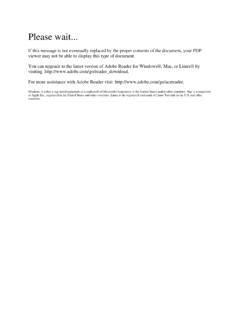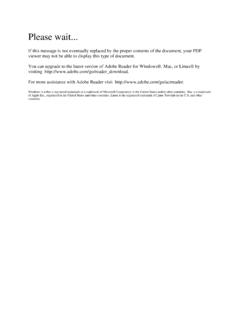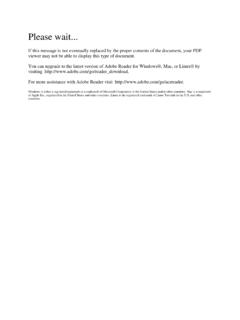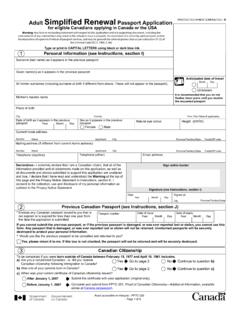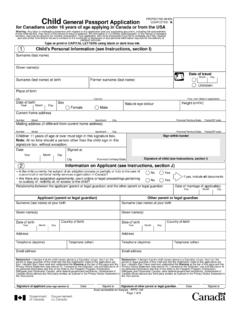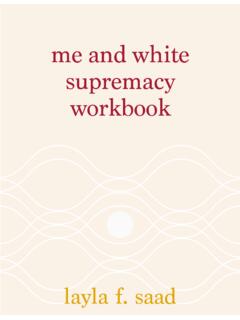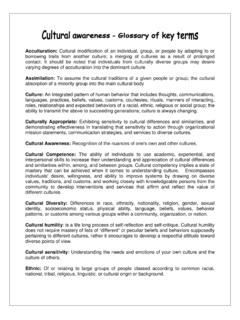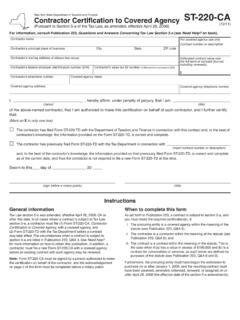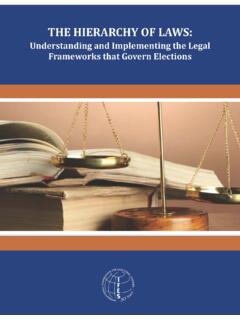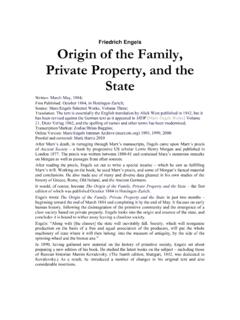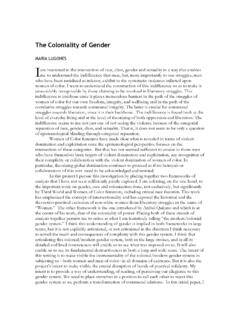Transcription of Canadian Charter of Rights and Freedoms
1 Whereas Canada is founded upon principles that recognize the supremacy of God and the rule of law: Guarantee of Rights and Freedoms 1. The Canadian Charter of Rights and Freedoms guarantees the Rights and Freedoms set out in it subject only to such reasonable limits prescribed by law as can be demonstrably justified in a free and democratic society. Fundamental Freedoms 2. Everyone has the following fundamental Freedoms : (a) freedom of conscience and religion; (b) freedom of thought, belief, opinion and expression, including freedom of the press and other media of communication; (c) freedom of peaceful assembly; and (d) freedom of association. Democratic Rights 3.
2 Every citizen of Canada has the right to vote in an election of members of the House of Commons or of a legislative assembly and to be qualified for membership therein. 4.(1) No House of Commons and no legislative assembly shall continue for longer than five years from the date fixed for the return of the writs at a general election of its members. (2) In time of real or apprehended war, invasion or insurrection, a House of Commons may be continued by Parliament and a legislative assembly may be continued by the legislature beyond five years if such continuation is not opposed by the votes of more than one-third of the members of the House of Commons or the legislative assembly, as the case may be.
3 5. There shall be a sitting of Parliament and of each legislature at least once every twelve months. Mobility Rights 6.(1) Every citizen of Canada has the right to enter, remain in and leave Canada. (2) Every citizen of Canada and every person who has the status of a permanent resident of Canada has the right (a) to move to and take up residence in any province; and (b) to pursue the gaining of a livelihood in any province. (3) The Rights specified in subsection (2) are subject to (a) any laws or practices of general application in force in a province other than those that discriminate among persons primarily on the basis of province of present or previous residence; and (b) any laws providing for reasonable residency requirements as a qualification for the receipt of publicly provided social services.
4 (4) Subsections (2) and (3) do not preclude any law, program or activity that has as its object the amelioration in a province of conditions of individuals in that province who are socially or economically disadvantaged if the rate of employment in that province is below the rate of employment in Canada. Legal Rights 7. Everyone has the right to life, liberty and security of the person and the right not to be deprived thereof except in accordance with the principles of fundamental justice. 8. Everyone has the right to be secure against unreasonable search or seizure. 9. Everyone has the right not to be arbitrarily detained or imprisoned. 10. Everyone has the right on arrest or detention (a) to be informed promptly of the reasons therefor; (b) to retain and instruct counsel without delay and to be informed of that right; and (c) to have the validity of the detention determined by way of habeas corpus and to be released if the detention is not lawful.
5 11. Any person charged with an offence has the right (a) to be informed without unreasonable delay of the specific offence; (b) to be tried within a reasonable time; (c) not to be compelled to be a witness in proceedings against that person in respect of the offence; (d) to be presumed innocent until proven guilty according to law in a fair and public hearing by an independent and impartial tribunal; (e) not to be denied reasonable bail without just cause; (f) except in the case of an offence under military law tried before a military tribunal, to the benefit of trial by jury where the maximum punishment for the offence is imprisonment for five years or a more severe punishment; (g) not to be found guilty on account of any act or omission unless, at the time of the act or omission, it constituted an offence under Canadian or international law or was criminal according to the general principles of law recognized by the community of nations; (h) if finally acquitted of the offence, not to be tried for it again and, if finally found guilty and punished for the offence, not to be tried or punished for it again.
6 And (i) if found guilty of the offence and if the punishment for the offence has been varied between the time of commission and the time of sentencing, to the benefit of the lesser punishment. 12. Everyone has the right not to be subjected to any cruel and unusual treatment or punishment. 13. A witness who testifies in any proceedings has the right not to have any incriminating evidence so given used to incriminate that witness in any other proceedings, except in a prosecution for perjury or for the giving of contradictory evidence. 14. A party or witness in any proceedings who does not understand or speak the language in which the proceedings are conducted or who is deaf has the right to the assistance of an interpreter.
7 Equality Rights 15.(1) Every individual is equal before and under the law and has the right to the equal protection and equal benefit of the law without discrimination and, in particular, without discrimination based on race, national or ethnic origin, colour, religion, sex, age or mental or physical disability. (2) Subsection (1) does not preclude any law, program or activity that has as its object the amelioration of conditions of disadvantaged individuals or groups including those that are disadvantaged because of race, national or ethnic origin, colour, religion, sex, age or mental or physical disability. Official Languages of Canada 16.(1) English and French are the official languages of Canada and have equality of status and equal Rights and privileges as to their use in all institutions of the Parliament and government of Canada.
8 (2) English and French are the official languages of New Brunswick and have equality of status and equal Rights and privileges as to their use in all institutions of the legislature and government of New Brunswick. (3) Nothing in this Charter limits the authority of Parliament or a legislature to advance the equality of status or use of English and French. (1) The English linguistic community and the French linguistic community in New Brunswick have equality of status and equal Rights and privileges, including the right to distinct educational institutions and such distinct cultural institutions as are necessary for the preservation and promotion of those communities.
9 (2) The role of the legislature and government of New Brunswick to preserve and promote the status, Rights and privileges referred to in subsection (1) is affirmed. 17.(1) Everyone has the right to use English or French in any debates and other proceedings of Parliament. (2) Everyone has the right to use English or French in any debates and other proceedings of the legislature of New (1) The statutes, records and journals of Parliament shall be printed and published in English and French and both language versions are equally authoritative. (2) The statutes, records and journals of the legislature of New Brunswick shall be printed and published in English and French and both language versions are equally (1) Either English or French may be used by any person in, or in any pleading in or process issuing from, any court established by Parliament.
10 (2) Either English or French may be used by any person in, or in any pleading in or process issuing from, any court of New Brunswick. 20.(1) Any member of the public in Canada has the right to communicate with, and to receive available services from, any head or central office of an institution of the Parliament or government of Canada in English or French, and has the same right with respect to any other office of any such institution where (a) there is a significant demand for communications with and services from that office in such language; or (b) due to the nature of the office, it is reasonable that communications with and services from that office be available in both English and French.
